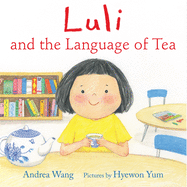In her author's note, Andrea Wang (Magic Ramen; Watercress), the daughter of Chinese immigrants, recalls her wonderment at learning that the word for "tea" is similar in many languages: "Why was this?" Readers of her gladdening picture book Luli and the Language of Tea, illustrated by Hyewon Yum (Saturday Is Swimming Day; Not Little), don't need to know why to grasp Wang's message: that generosity can be a universal language.
In "the playroom" (a childcare classroom per a sign by the door), Luli is surrounded by other kids who can't speak English, all of whom are playing alone. Today she has come prepared. From her backpack she produces tea-making gear; after she has set up, she calls "Chá!"--"tea" in Chinese. Upon recognizing the word "Chá!," the kids respond with the word for "tea" in their primary languages and then gather around Luli's table. She passes cups of tea to the child beside her, who passes them on and so forth, until... uh-oh: there's no tea for Luli! Happily, the kids have a solution. By story's end, "Luli's teapot was empty, but her heart was full."
Yum demonstrates her facility with colored pencils in Luli'sclassroom scenes and endpapers, in which a glorious spread captures an assortment of teacups, each decorated in a style suited to the country it represents. But the book's most pleasing illustrations are the aerial views of the kids sitting at Luli's table; the intricately decorated teapot may be the centerpiece, but Luli is the star. --Nell Beram, freelance writer and YA author




No comments:
Post a Comment
Note: Only a member of this blog may post a comment.